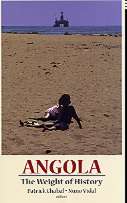|
Reviewed by Edward Lynch, Ph.D., Associate Professor of Political Science and Director of Master of Arts in Liberal Studies Program at Hollins University Too often, edited volumes lack much of a binding element beyond the title or theme of the book, and can seem more like literary marriages of convenience than true contributions to understanding and knowledge. Angola: The Weight of History is an exception to this rule. From the onset, it is clear that Angola’s inability to transition to a democracy is the over-arching subject of the volume. The book’s editors, Patrick Chabal and Nuno Vidal, work diligently to ensure the essays maintain continuity with this theme. Chabal makes the point in his opening essay that far too many studies of Angola treat the country’s experiences as unique. “I will try to show instead,” he says, “that it is more fruitful to consider the fate of Angola within the overall African context.” (2). This thesis becomes the lens through which the editors seek to frame Angola’s efforts to establish a democracy. The most useful offering in the book is Malyn Newitt’s chapter the history of Angola—even though she contradicts Chabal on the first page by saying she will treat Angola as unique. Her chapter reads as a balanced and sober treatment of the horrific Portuguese colonial experience, and a helpful explanation of the interminable civil war in the country, which involved the U.S., the Soviet Union, China, Cuba and South Africa. Newitt expertly describes the rise of the two main factions in Angolan politics—the Marxist-Leninist ruling party, the Movimento Popular de Libertação de Angola (MPLA) and the anti-Communist faction, the National Union for the Total Independence of Angola (UNITA)—and describes their history and roles in the Angolan Civil War. Newitt’s well-researched history chapter is followed by the weakest chapter in the book, with its appropriately awkward title—“The Mutation of Hegemonic Domination.” In a stark contrast with Newitt’s exhaustively annotated history chapter, Christine Messiant—the chapter’s author—does not quote additional secondary sources beyond her own earlier writings on Angola. On the plus side, the contributors make it clear that the major impediment to a successful democratic transition in Angola is the unwillingness of the MPLA to relinquish its stranglehold. Through a combition of deception, broken promises, electoral chicanery and occasional outright repression, the MPLA has managed to hold on to power since the official end of the civil war in 1992. In some cases, however, even where the authors note the undemocratic nature of the ruling party, they recast the issue as a restatement of an old question—“Can democracy work in Africa?”—without an honest assesment of an answer. Chabal seems to assign some of the blame to Angolans, and to Africans more generally, for not using the ballot box to oust ineffective and/or undemocratic regimes. Other authors scold the government for insituting electoral procedures designed to protect the rulers, not to empower the people. But it is not until the last chapter of the volume, “Social Neglect and the Emergence of Civil Society” that Vidal gets to the heart of the matter. True democracy, whether in Africa or Antarctica, does not depend on the right combination of governmental structures, and still less on the skillful manipulation of electoral laws. Rather, it depends on the willingness of people to look to themselves, and to non-governmental institutions that the people have created, to bring peace, security and prosperity. So long as Angolans must depend on government as a social safety net, instead of civil society, they will not achieve democracy unless some future government is willing to give it to them. And such a democracy will last only until the government decides to take it away. Democracy is not given from above; it is created, and then fiercely guarded, from below. Only a strong civil society can do these things, and thus civil society is the most crucial variable in democratization. As Vidal’s chapter is the only one in the volume to assertively address this, it ought to have been the first, not the last, chapter in the book. While too specific and too academic in tone to be useful on the introductory level, the book’s factual richness, balance and thematic consistency make it a worthwhile addition to any college library, and a useful supplemental text for courses on Africa, democratization, civil war or political development. |


 Angola:The Weight of History
Angola:The Weight of History